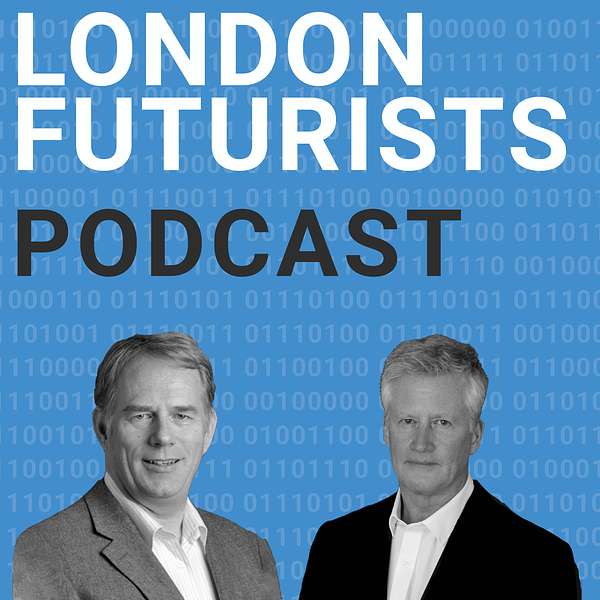
London Futurists
Anticipating and managing exponential impact - hosts David Wood and Calum Chace
Calum Chace is a sought-after keynote speaker and best-selling writer on artificial intelligence. He focuses on the medium- and long-term impact of AI on all of us, our societies and our economies. He advises companies and governments on AI policy.
His non-fiction books on AI are Surviving AI, about superintelligence, and The Economic Singularity, about the future of jobs. Both are now in their third editions.
He also wrote Pandora's Brain and Pandora’s Oracle, a pair of techno-thrillers about the first superintelligence. He is a regular contributor to magazines, newspapers, and radio.
In the last decade, Calum has given over 150 talks in 20 countries on six continents. Videos of his talks, and lots of other materials are available at https://calumchace.com/.
He is co-founder of a think tank focused on the future of jobs, called the Economic Singularity Foundation. The Foundation has published Stories from 2045, a collection of short stories written by its members.
Before becoming a full-time writer and speaker, Calum had a 30-year career in journalism and in business, as a marketer, a strategy consultant and a CEO. He studied philosophy, politics, and economics at Oxford University, which confirmed his suspicion that science fiction is actually philosophy in fancy dress.
David Wood is Chair of London Futurists, and is the author or lead editor of twelve books about the future, including The Singularity Principles, Vital Foresight, The Abolition of Aging, Smartphones and Beyond, and Sustainable Superabundance.
He is also principal of the independent futurist consultancy and publisher Delta Wisdom, executive director of the Longevity Escape Velocity (LEV) Foundation, Foresight Advisor at SingularityNET, and a board director at the IEET (Institute for Ethics and Emerging Technologies). He regularly gives keynote talks around the world on how to prepare for radical disruption. See https://deltawisdom.com/.
As a pioneer of the mobile computing and smartphone industry, he co-founded Symbian in 1998. By 2012, software written by his teams had been included as the operating system on 500 million smartphones.
From 2010 to 2013, he was Technology Planning Lead (CTO) of Accenture Mobility, where he also co-led Accenture’s Mobility Health business initiative.
Has an MA in Mathematics from Cambridge, where he also undertook doctoral research in the Philosophy of Science, and a DSc from the University of Westminster.
London Futurists
Assessing Quantum Computing, with Ignacio Cirac
Use Left/Right to seek, Home/End to jump to start or end. Hold shift to jump forward or backward.
Quantum computing is a tough subject to explain and discuss. As Niels Bohr put it, “Anyone who is not shocked by quantum theory has not understood it”. Richard Feynman helpfully added, “I think I can safely say that nobody understands quantum mechanics”.
Quantum computing employs the weird properties of quantum mechanics like superposition and entanglement. Classical computing uses binary digits, or bits, which are either on or off. Quantum computing uses qubits, which can be both on and off at the same time, and this characteristic somehow makes them enormously more computationally powerful.
Co-hosts Calum and David knew that to address this important but difficult subject, we needed an absolute expert, who was capable of explaining it in lay terms. When Calum heard Dr Ignacio Cirac give a talk on the subject in Madrid last month, he knew we had found our man.
Ignacio is director of the Max Planck Institute of Quantum Optics in Germany, and holds honorary and visiting professorships pretty much everywhere that serious work is done on quantum physics. He has done seminal work on the trapped ion approach to quantum computing and several other aspects of the field, and has published almost 500 papers in prestigious journals. He is spoken of as a possible Nobel Prize winner.
Topics discussed in this conversation include:
*) A brief history of quantum computing (QC) from the 1990s to the present
*) The kinds of computation where QC can out-perform classical computers
*) Likely timescales for further progress in the field
*) Potential quantum analogies of Moore's Law
*) Physical qubits contrasted with logical qubits
*) Reasons why errors often arise with qubits - and approaches to reducing these errors
*) Different approaches to the hardware platforms of QC - and which are most likely to prove successful
*) Ways in which academia can compete with (and complement) large technology companies
*) The significance of "quantum supremacy" or "quantum advantage": what has been achieved already, and what might be achieved in the future
*) The risks of a forthcoming "quantum computing winter", similar to the AI winters in which funding was reduced
*) Other comparisons and connections between AI and QC
*) The case for keeping an open mind, and for supporting diverse approaches, regarding QC platforms
*) Assessing the threats posed by Shor's algorithm and fault-tolerant QC
*) Why companies should already be considering changing the encryption systems that are intended to keep their data secure
*) Advice on how companies can build and manage in-house "quantum teams"
Music: Spike Protein, by Koi Discovery, available under CC0 1.0 Public Domain Declaration
Selected follow-up reading:
https://en.wikipedia.org/wiki/Juan_Ignacio_Cirac_Sasturain
https://en.wikipedia.org/wiki/Rydberg_atom
Elevate how you lead with insight from today’s most influential executives.
Listen on: Apple Podcasts Spotify

